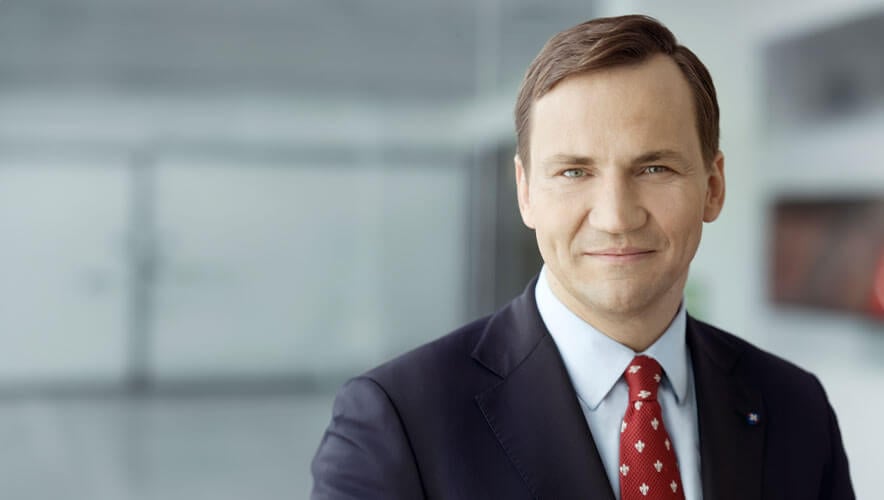Sikorski: Why We Should Be Committed to Ukraine
Country borders are sometimes shaped by the natural world—where the edges of a nation’s territory meet the sea, river, or mountain range. But they’re also shaped by treaties, negotiations, conflict, and colonialism.
Russia’s efforts to seize control of Ukraine by military force represents a 21st Century colonial attempt to rebuild Russia’s empire, a breach of international law and norms formed following World War II when then-German Chancellor Adolf Hitler attempted similar measures to redraw the map of Europe.
If successful, Russia’s victory will set the stage for a new era of flourishing authoritarianism, increased defense spending in Europe and the United States, and a potential threat to the global world order, said Radosław “Radek” Sikorski, member of the European Parliament (MP) representing the Kyavian-Pomeranian region of Poland and a 2023 general session speaker at GSX 2023 in Dallas, Texas.
“This is a classic colonial war,” Sikorski explained. “Russia didn’t invade Ukraine because it felt threatened. Russia knows NATO is a defense alliance and has no intention—or capability—to attack Russia. If NATO was provoking Russia to invade, Russia would be invading Finland and Sweden.”
SponsoredSecurity and Surveillance Solutions Like No OtherAt GSX 2023, Hanwha Vision is showcasing an array of new products and solutions in Booth #3123 in Artificial Intelligence (AI) Hanwha stands at the forefront of AI innovation and will demonstrate new uses of AI in PTZ and Q series cameras, delivering precise detection, robust search capabilities, elevated data analysis, and enhanced image quality. Also on display will be FLEX AI technology machine learning which helps our cameras continually learn to recognize key objects for more efficient operation. |
Sikorski appeared before attendees virtually from Warsaw, Poland, after completing a trip via train to Ukraine—a trip he has made every few months as Russia’s aggression continues. He plays an important role as an ally to Ukraine, not only because of his MP position representing Poland but also because he sits on the Committee for Foreign Affairs and the Security and Defence Subcommittee at the European Parliament, and is the chairman of the delegation for relations with the United States.
On previous journeys to Ukraine, Sikorski worked to coordinate and transport pick-up trucks to Ukrainian soldiers, which carry supplies and wounded individuals to hospitals. Sikorski has also traveled to Bucha, the site of some of the worst atrocities of the war, as well as to 18 miles from the front line to meet Ukrainian soldiers and view how some of the military weapons being provided to Ukraine from its allies are used.
Despite being outnumbered and lacking air superiority in the current conflict, Sikorski said that Ukraine has performed much better than expected. But, after visiting Kiev this past week, Sikorski said that he also observed that people are getting tired after almost one year and seven months of war.
Ukrainians “have made huge sacrifices in towns and villages,” he added. “There are huge spaces of freshly dug graves. They’ve lost many of their best people. They have the right to be tired.”
The rest of the world, however, does not have this right, Sikorski said. In the lead-up to and following Russia’s invasion, Western democracies have rallied together to support Ukraine. Both Europe (when viewed as a whole) and the United States have contributed about $70 billion in aid to Ukraine so far.
This support has been critical to Ukraine’s survival, and also demonstrates that the United States and the United Kingdom remain committed to the Budapest Memorandum of 1994. In that pledge, Russia, the United Kingdoms of Great Britain and Northern Ireland, and the United States committed to assure Ukraine’s security in exchange for Ukraine giving up its nuclear weapons arsenal.
“Think about the consequences of not following those guarantees,” Sikorski said. For instance, North Korea or Pakistan might refuse to engage in negotiations with the United States or United Kingdom about nuclear disarmament in exchange for security guarantees because of perceived failures to support Ukraine in its struggle against Russia.”
“If we ever hope to persuade others to give up their nukes, but we allow Ukraine to fall, they will never accept that argument,” Sikorski explained.
We need to secure democracy worldwide by winning in Ukraine—by not tiring in our confidence or our commitments.
This means that Europe, the United States, and the rest of Ukraine’s allies should continue to support Ukraine through a conflict that is likely to last at least four more years.
“It took the British seven years to give up on the 13 colonies, and they only gave up when the sacrifice in blood and treasure wasn’t worth the victory,” Sikorski said. Russia will likely follow a similar pattern, and only retreat if the objective—controlling and reclaiming Ukraine—is “unachievable at an acceptable cost,” he added.
Getting Russia to this point, however, is extremely important because Ukraine is a geopolitical swing country.
“If Russia recaptures Ukraine, it will be again the Russian empire capable of threatening the West,” Sikorski said. “If Ukraine loses, it will swing the balance globally, ideologically, between the world of democracy and the world of autocracy.”
And it’s not just the West that is watching how this conflict plays out. China and its president, Xi Jinping, are taking notice of how the world responds to Russia’s aggression and how long Western allies continue to come to Ukraine’s aid, Sikorski adds.
This makes supporting Ukraine even more important because, globally, we “have to show Putin and Xi that breaking the taboos that were established after the second World War are not allowed,” Sikorski says.
“For the sake of justice and democracy, for the sake of deterring China, for the sake of deterring Putin, and for the sake of our own economic resources, we need to stay the course,” he added. “We need to secure democracy worldwide by winning in Ukraine—by not tiring in our confidence or our commitments.”
Want more insights on how global security issues affect your organization? Check out Tuesday’s special GSX 2023 panel discussion “Geopolitics in Context: How Global Affairs Affect Local Security” at 10:30 a.m. CT in room C141/143/149. Global security experts Diana M. Concannon, PsyD, PCI, CTM; Alejandro Liberman, CPP; RC Miles, CPP; and Peter L. Morton, CPP, will participate in a panel discussion moderated by Godfried Hendriks, CPP, about how geopolitics and political instability affect extremism, risk, and organizational resilience.
Megan Gates is the editor-in-chief of Security Technology and the GSX Daily, which is published by Security Management. Connect with her at [email protected] or on LinkedIn. Follow her on Twitter or Threads: @mgngates.












